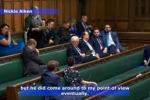Two Cities MP, Nickie Aiken, contributed to a Westminster Hall debate on the planning reforms, and called for greater engagement with local people throughout the planning system, protection of conservation areas, affordable and appropriate homes, and the ability for local authorities to influence local developments.
Speak at the debate, Nickie contributed,
"It is a pleasure to serve under your chairmanship, Mrs Cummins. I congratulate my hon. Friend the Member for Isle of Wight (Bob Seely) on securing this important debate. Generally speaking, I find the proposals outlined in the White Paper to be positive, but there is much to be done to refine our approach to make it a solid foundation for a 21st-century planning system.
First, as a local councillor for 15 years, I want to emphasise the importance of engaging local communities to get it right from the very start of any planning system. Of course there is a practical side, in terms of context, utilities and amenities, as well as the need to protect well-loved conservation areas, particularly in a constituency like mine.
In my personal experience as a councillor, local people are not nimbys, but want and deserve quality homes that are appropriate to where they live. I know from speaking to constituents in the Cities of London and Westminster that the vast majority of people who live there are keen for their children and grandchildren to be able to remain in the area, but sadly, at the moment that is not always the case. I recognise that the Government are paving the way on bricks and mortar, but there is still a long way to go to reach the Government target of 300,000 homes a year.
It is not just about the numbers. My constituents want homes that they can grow up in and remain in when they have families. We want our children to know a range of people from all walks of life. In the Cities of London and Westminster there is a perception that the housing market is polarised between the multimillion-pound properties for oligarchs and very wealthy people, and council-run estates and housing association homes. What we need, and what local people want, is affordable and appropriate homes in the middle ground that keep neighbourhoods as thriving, friendly communities.
I urge the Minister to ensure not only that local residents are sufficiently consulted, but that there is a concerted effort to increase local democracy when it comes to the final planning reforms, which we will see when the legislation comes forward. On a practical level, one way of doing so is to address the issues of change in use class between residential and different types of commercial activity. There have been recent changes in planning legislation that are already having a major effect on constituencies like mine and not giving local authorities the flexibility that they need. For example, the introduction of the commercial, business and service use of class E, as well as permitted development rights, makes it now significantly more difficult for local authorities to influence the way in which areas develop.
These changes have also removed the funding that used to be provided through section 106 and the strategic industrial locations process. If every commercial use is considered to be the same use class, then any change of use requires little or no approval and provides no funding, even for the infrastructure that is so badly needed to make all of this work.
The same goes for the permitted development rights process. We have an increasing number of class E premises that are changing from shops to restaurants, without any requirement for planning permission to manage issues such as servicing and hours of use. That means that licensing has to take up the slack. Planning is pushing the problem over to local authority licensing committees, and that is not on. It is important that the planning process should listen to residents. It should take into account their views and the appropriateness of changes in residential and commercial uses for communities and local authorities.
A second way to bolster local democracy, which the Ministry of Housing, Communities and Local Government should consider, is improvements to the appeals process for planning applications. That is much in the spirit of the Prime Minister’s stated ambition to give constituents
“a greater say over what gets built”
in their community, but allow me to quote the Covent Garden Community Association, which wrote that we need
“to rebalance the appeals process in the current planning system. The fact that applicants can appeal to the Planning Inspector but local communities can only appeal to the High Court sets up an imbalance of risk”.
There is much to welcome in the planning reforms, but local democracy still needs to be at their very heart."






